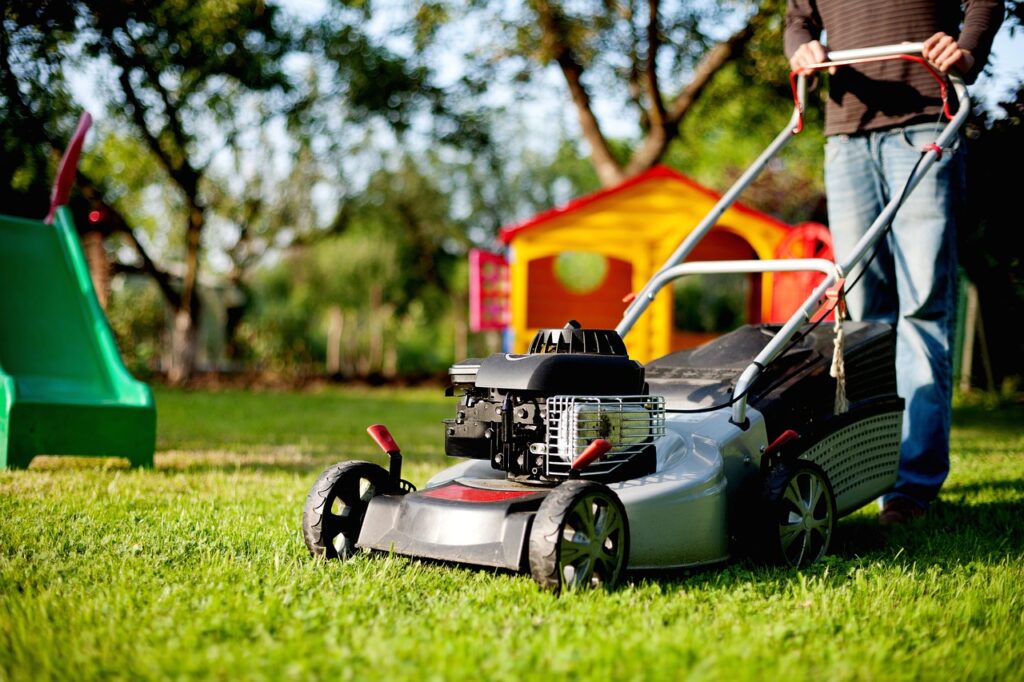Different Types of Battery-Powered Lawn Mowers
As technology advances, more lawn mowers are transitioning from gas-powered engines to battery-powered systems. Today, battery-operated mowers come in various forms, including push mowers, riding mowers, and remote-controlled models. Each type has its unique features, making them suitable for different lawn care needs.
Push Mowers
Battery-powered push mowers are a great choice for small to medium-sized lawns. These mowers are typically limited by their battery life, which ranges from 30 minutes to an hour, depending on the model. Push mowers come in several variations, including traditional push mowers, self-propelled models, and mulching mowers that finely chop grass clippings to promote a healthier lawn.
Battery specifications for push mowers generally range from 2 to 3 Ah, with voltage between 18 and 60 volts, and use either lead-acid or lithium batteries. While the specific performance may vary between corded and cordless models, most users find these mowers easy to use and efficient for regular lawn maintenance.
Riding Mowers
Electric riding mowers, or lawn tractors, provide a premium mowing experience, especially for larger lawns. While riding mowers have traditionally been gas-powered, several brands like Cub Cadet, John Deere, and others now offer fully electric models, including both traditional riding mowers and zero-turn mowers.
Electric riding mowers typically use powerful lithium-ion batteries, which offer longer lifespans, higher efficiency, and quicker discharge rates. This allows them to cover large areas—up to 2 acres—on a single charge. However, these mowers come with a higher upfront cost, generally ranging from $3,000 to $8,000. Despite the higher price, as battery technology continues to improve, the cost of electric riding mowers is expected to decrease over time.
Remote Control Mowers
For those seeking a balance between battery capacity and performance, remote control mowers offer an innovative solution. These mowers are ideal for larger lawns where electric push mowers might lack the power, but riding mowers might be overkill.A standout example is the MC700 Remote Control Lawn Mower.
Pros and Cons of Battery-Powered Lawn Mowers
Advantages of Battery-Powered Lawn Mowers
Battery-operated lawn mowers offer several benefits that make them a popular choice for homeowners. Here are some of the key advantages:
- Environmentally Friendly
Battery-powered mowers produce no emissions, making them an eco-friendly alternative to gas-powered mowers. By using electricity instead of gasoline, they help reduce air pollution and your carbon footprint.
- Quieter Operation
Unlike gas-powered mowers, which can be quite noisy, battery-powered mowers operate much more quietly. This makes them ideal for residential areas where noise pollution can be a concern, especially early in the morning or late in the evening.
- Low Maintenance
Battery mowers require far less maintenance compared to gas-powered models. There’s no need to worry about changing oil, maintaining fuel lines, or dealing with spark plugs. Simply charge the battery, and you’re good to go.
- Cost-Effective in the Long Run
While the initial cost of a battery-operated mower may be higher, it can save you money over time. You won’t need to buy gasoline, and there are fewer parts that wear out, which means fewer repairs and replacements.
- Lightweight and Easy to Maneuver
Battery-powered mowers are typically lighter than their gas counterparts, making them easier to push or maneuver around your yard. This can be a significant advantage, especially for users who have smaller lawns or need to navigate around obstacles.
- No Fumes or Gasoline Smell
With battery-powered mowers, there’s no need to deal with the unpleasant smell of gasoline or the fumes that come from gas engines. This makes mowing your lawn a more pleasant experience.
Disadvantages of Battery-Powered Lawn Mowers
While there are many benefits, battery-operated mowers do come with some limitations:
- Limited Run Time
Battery life can be a limiting factor for larger lawns. Most battery-operated mowers run for 30 minutes to an hour on a full charge, which may not be enough to mow a large yard in one go. While some models offer longer run times, they still require periodic recharging.
- Higher Upfront Cost
Battery-powered mowers generally come with a higher initial cost compared to gas-powered models. Although they can be more economical in the long run due to lower maintenance and fuel costs, the upfront investment can be a deterrent for some buyers.
- Battery Replacement
Over time, the battery in a battery-powered mower will degrade and eventually need to be replaced. Depending on the type of battery and the model, this can be an expensive replacement. However, battery technology is improving, and many manufacturers offer warranties for battery longevity.
- Limited Power for Tough Grass
Battery-powered mowers can struggle to handle dense, overgrown grass or tough terrain. While they work well for regular mowing, they may not have the same cutting power as gas-powered mowers, especially on more challenging lawns.
- Charging Time
While charging a battery is more convenient than refueling a gas mower, it still takes time. Depending on the model, it can take several hours for a battery to fully charge, which may not be ideal for those who need to mow their lawns quickly or in one session.
In summary, battery-powered lawn mowers offer significant advantages in terms of eco-friendliness, convenience, and ease of maintenance. However, they may not be the best option for everyone, particularly those with large lawns or heavy-duty mowing needs. It’s important to weigh both the pros and cons to determine if a battery-operated mower is the right choice for your lawn care routine.
Benefits of Battery-Powered Lawn Mowers
- Eco-Friendly
Battery-powered lawn mowers are significantly more environmentally friendly than their gas counterparts. Gas mowers release approximately 16 times more CO2 per acre than electric models, making battery-operated mowers a cleaner, greener option for maintaining your lawn.
- Reduced Noise Pollution
In addition to being better for the environment, battery-powered mowers are much quieter than gas mowers. This results in less noise pollution, which is especially important in residential areas where excessive noise can be disruptive.
- Lower Maintenance Costs
Investing in an electric lawn mower can save you money on maintenance in the long run. On average, electric mowers cost $9 less in maintenance for every hour of use compared to gas-powered mowers, due to fewer parts that need servicing and no need for oil changes or fuel-related repairs.
- Easy Start with the Push of a Button
One of the most convenient features of battery-operated lawn mowers is their ease of use. Starting the mower is as simple as pushing a button—no need for pull cords or complicated starting mechanisms, making the entire mowing process more user-friendly.
Should You Buy a Battery-Powered Lawn Mower?
Yes, investing in a battery-powered lawn mower is a smart choice for your home. Not only will you enjoy significant environmental benefits, but you’ll also save on long-term maintenance costs. Additionally, choosing a battery-operated model opens the door to a range of innovative lawn care solutions. For example, robotic lawn mowers and remote-controlled mowers are exclusively available in battery-powered versions. By sticking with gas-powered models, you may miss out on the cutting-edge technology shaping the future of lawn and garden equipment.
Battery-Powered Lawn Mowers: Pros and Cons FAQs
What Size Battery Does a Lawn Mower Need?
The size of the battery required for your lawn mower depends on the model. For smaller mowers, such as push models, a 12-volt battery may be sufficient. However, larger mowers like lawn tractors require more powerful batteries, typically ranging from 40V to 21 Ah or even higher, especially for higher-end models. The battery size you need will ultimately depend on the type and size of your lawn mower.
How Long Does a Lawn Mower Battery Last?
A lawn mower battery’s lifespan can vary between 1 and 15 years, depending on the type of battery and how well it’s maintained. Lead-acid batteries, which are less commonly used today, typically last only 1 to 4 years or around 200 charging cycles.
Modern electric lawn mowers typically use more efficient lithium-ion or lithium iron phosphate (LiFePO4) batteries, which can last 4 to 6 times longer than lead-acid batteries. These newer batteries also offer greater power capacity, degrade more slowly, and require less maintenance, making them a more reliable and durable option for long-term use.


